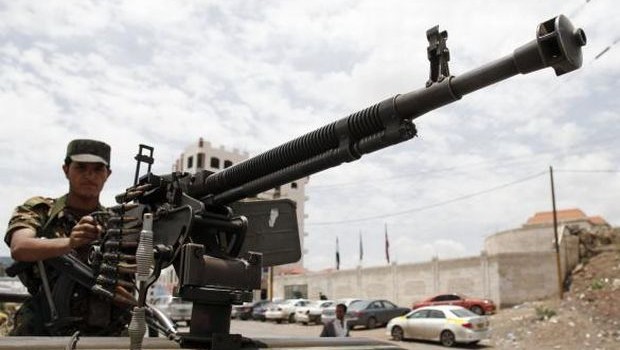
A member of Yemen’s newly formed Special Security Forces is stationed at a machine gun mounted on a patrol vehicle at a checkpoint in Sanaa. (REUTERS)
There are two main military elements to the announcement. The most important element is the reorganization of the Yemeni ground forces. Although this may appear a minor step, it—together with the administrative procedures that are likely to accompany it—will go far in professionalizing the Yemeni ground forces and breaking up patronage networks. Not only have all the ground-holding commands been reduced in geographical extent and military mass, but it is likely that commanders will be posted in and out of appointments on a two- to three-year basis. This will return Yemen to the long-established military principle, exemplified by the Ottoman Empire’s janissaries, that a commander should not establish roots—and thus alternative loyalties. Unit loyalty should therefore return to the Yemeni state, rather than to chronically entrenched military magnates.
The reduction in Area Of Responsibility also reduces a number of potential opportunities for abuse in several key areas. The most important is the diminution in size of the commands. Not only does this reduction limit the forces under any one commander—no longer will a single regional commander wield state-threatening military power, as did Ali Muhsin Salih or Ahmad Ali Abdallah. Interestingly, the Regional Commanders no longer have direct, personal command of combat power, as was previously the custom; they merely command subordinate units. This, too, will limit their ability to threaten the state.
The smaller size of commands also reduces the ability of any one commander to generate vast personal wealth by skimming wages and allowances, or mustering as many “ghost” soldiers who only exist on paper, allowing their commander to pocket their pay. Further, the length of border that can be “protected” (i.e., used for direct smuggling) is dramatically reduced, proportionately decreasing profits to be made. Additionally, it appears that the lucrative Eastern Region has also been split horizontally, so that one command no longer controls both the Indian Ocean shore and the Saudi border.
As important to the de-personalisation of the military structure has been the removal of many former military “patrons” from the scene. It is doubtless the need to co-ordinate the simultaneous assignment of all these to decorous postings remote from the fray that has taken so long: it has been reported that the sponsors of the GCC deal wanted this step to occur in December 2012, when the previous measures were announced, rather than in April. Although ostracizing the former president’s family is an important measure, it should not be overstated. Not only are they, for the most part, only a few hours’ flight away, but commanders operate a tactical bound behind their troops, issuing orders through the communication channels of the day. The relocation of Saleh and his kin has not changed that much.
However, two significant actors are also involved. The first is Ali Muhsin Salih, erstwhile commander of 1st Armored Division and North West Military Region. His Sana’a headquarters has allegedly been turned into a public park, and he himself has been appointed a “Military Adviser” to the president, who has been extensively educated in both Western and Soviet military systems and needs little military advice. It is likely that this is the only possible appointment that would pry Ali Muhsin from his position, since previous attempts to appoint him to roles abroad reportedly foundered on his Salafism and alleged links to jihadis. Muhammad Ali Muhsin—a friend, but no relation, of Ali Muhsin Salih, as well as a long-term member of the Sanhani clique—was also sent out to luxurious pasture in Qatar.
Also appointed abroad is the one of the Al-Ahmar dynasty: Hashim Abdullah Husayn. This is a symbolically important inclusion of a member of the heavily armed forces of the Hashid Tribal Confederation, which have thus far been almost ignored in Yemen’s political rearrangements. While his eldest brother, Sadiq, is the paramount chief of Hashid, and his elder brother Hamid is one of Yemen’s wealthiest and most politically active citizens, Hashim was seen on YouTube directing artillery fire onto loyalist forces in 2011, so a fitting representative of Hashid to send abroad, to reassure the pro-Ali Abdallah Saleh forces (and the almost-forgotten youth) of political balance.
The US—which has the Friends of Yemen lead in security sector reform—has shown itself to have learned from the many mistakes of the previous decade. Not only has it chosen evolution over the kind of revolution it tried in Iraqi SSR, it has also enshrined important measures for democratic oversight of the intelligence services. These are mostly missing in Iraq and Afghanistan, which has allowed Karzai and Maliki to create presidential forces accountable to none but themselves.
While there are risks that some Loyalists may attempt to kick over the traces, these are limited by the political sticks the GCC sponsors hold. This program represents an even, progressive and potentially important step in the subordination of the Yemeni Armed Forces to the Yemeni state. Its success—or otherwise—should be visible within three years, with the first posting of commanders.
As importantly, while this SSR programme may have had US advice and funding, their subtle approach in giving it Yemeni “ownership” is a welcome change from the Neo-Conservatives’ brash attitude. Indeed, it harks back to another era: as T. E. Lawrence wrote, “Better the Arabs do it tolerably than that you do it perfectly. It is their war, and you are to help them, not to win it for them.”
